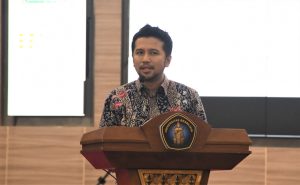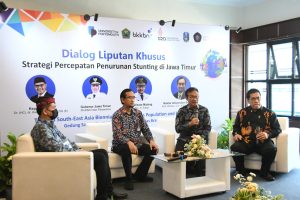
The National Population and Family Planning Agency (BKKBN) held an International Conference on Population and Health, The 2nd South-East Asia Biennial Conference on Population and Health in Malang City, East Java, and opened Tuesday (04/10/2022) .
The conference that was held by the BKKBN in collaboration with Brawijaya University Malang, Indonesia and the University of Portsmouth, England was the main discussion related to stunting and also the demographic bonus. The conference will last for two days, 4-6 October 2022.

The second conference was also actively attended by participants from five countries including Japan, China, Malaysia, Singapore and the Philippines. The first conference was held in Malang City on 7-9 November 2018.
The aim of this annual conference is to bring together population and health researchers from around the world to discuss some of the contemporary population and health issues in the Southeast Asian region.
The activity, which was held by a hybrid meeting, was attended online by the Dean of the Faculty of Science, Portsmouth University of the United Kingdom, Prof. Sherria Hoskins and United Nations Fund for Population Activities (UNFPA) Country Representation Indonesia Dr. Anjali Sen.
 The Head of the Central BKKBN, Dr. (H.C.) dr. Hasto Wardoyo, Sp.OG (K), Head Director of the National Institute for Population and Family Development (LPPKN) Malaysia YBrs. Encik Abdul Shukur bin Abdullah, Deputy Governor of East Java Dr. H. Emil Elestianto Dardak, B.Bus., M.Sc, Deputy Mayor of Malang Ir. H. Sofyan Edi Jarwoko and Chancellor of Brawijaya University Prof. Widodo, S.Si.,M.Si. , Ph.D. Med.Sc, Deputy for Training, Research and Development (Lalitbang) BKKBN Prof. drh. Muhammad Rizal Martua Damanik, M.Rep.Sc, Ph.D, and Deputy for Advocacy, Mobilization and Information (Adpin) BKKBN Drs. Sukaryo Teguh Santoso, M.M.
The Head of the Central BKKBN, Dr. (H.C.) dr. Hasto Wardoyo, Sp.OG (K), Head Director of the National Institute for Population and Family Development (LPPKN) Malaysia YBrs. Encik Abdul Shukur bin Abdullah, Deputy Governor of East Java Dr. H. Emil Elestianto Dardak, B.Bus., M.Sc, Deputy Mayor of Malang Ir. H. Sofyan Edi Jarwoko and Chancellor of Brawijaya University Prof. Widodo, S.Si.,M.Si. , Ph.D. Med.Sc, Deputy for Training, Research and Development (Lalitbang) BKKBN Prof. drh. Muhammad Rizal Martua Damanik, M.Rep.Sc, Ph.D, and Deputy for Advocacy, Mobilization and Information (Adpin) BKKBN Drs. Sukaryo Teguh Santoso, M.M.
In his remarks, Head of BKKBN Dr. (HC) dr. Hasto Wardoyo, Sp.OG (K) said that the proportion of the working age population (15 to 64 years) has increased due to a decrease in the birth rate, thereby creating an opportunity for a demographic bonus. Doctor Hasto said this proportion is expected to peak in the period 2025-2030.
Doctor Hasto also mentioned that women play a very important role in the process of demographic transition.

Doctor Hasto said that Indonesia’s ability to compete in the global market ultimately depends on an increasing human resource base. In 2030 almost 10 percent of the population will be aged 60 years and over, which means that Indonesia will enter an aging population in that year.
“We need to support the elderly population to be healthy and productive as well as to become ‘active seniors’. Then, later the number of women will be more and more than men. Therefore, how the role of women in the economy becomes very important later, “explained Doctor Hasto.
Because of that, Doctor Hasto emphasized how Indonesia in the future can create a good generation when entering an aging population which is very closely related to reducing stunting.
Based on the Presidential Regulation of the Republic of Indonesia number 72 of 2021 concerning Accelerating the Reduction of Stunting, the BKKBN has the mandate to work together with the relevant Ministries/Institutions to make efforts to accelerate the reduction of stunting in Indonesia.
The Republic of Indonesia’s Presidential Regulation has been ratified, the National Action Plan, as well as supporting tools for its implementation have also been prepared. We hope that the target of achieving a stunting reduction of 14% in 2024 can be achieved.
In his remarks, Representative of UNFPA Indonesia Dr. Anjali Sen said that there are challenges in population dynamics and the problem of stunting.
According to Anjali Sen, most countries in the Southeast Asian region have entered a period of demographic bonus as a result of the sharp decline in birth rates. The population quantity is still of strategic value, but at the same time the quality of the population is still questionable.
Anjali Sen said another problem was related to the uneven distribution of population throughout the country, especially the outermost remote islands. For this reason, sustainable development as a commitment to the 2030 Agenda related to population issues, such as: population growth, aging, urbanization and migration needs attention from all parties.
“Currently, population dynamics are growing rapidly so we all have to mitigate the negative impacts of population dynamics. With this conference, it is hoped that it will be able to provide the best solutions and recommendations in handling population and health problems,” explained Anjali Sen in her remarks online.
Meanwhile, Deputy Governor of East Java Emil Dardak said that in order to accelerate the reduction of stunting, there are several approaches that can be taken, one of which is through the family.
“The family is the most important unit in making a policy. For example, we don’t solve the sanitation problem by looking at it per person, but we calculate it by the number of families,” said Emil Dardak.
According to Emil Dardak, the problem of stunting is not solved after the baby is born, but rather prevention. “How do young girls have adequate nutrition, how do they prepare to be future mothers. Of course this requires the role of the family and of course this family-based approach is very important in handling stunting,” he said.
Meanwhile, the Chancellor of Brawijaya University, Prof. Widodo in the talk show explained that Higher Education also has an essential role in supporting the Acceleration of Stunting Reduction through 3 pillars, namely Education, research and community service.
Meanwhile, the Chancellor of Brawijaya University, Prof. Widodo in the talk show explained that Higher Education also has an essential role in supporting the Acceleration of Stunting Reduction through 3 pillars, namely Education, research and community service.
Population, family planning and family development issues including stunting are in accordance with the mandate of the Sustainable Development Goals (SDGs) number 1 “Eradicate Poverty”, number 2 “End Hunger”, number 3 “Health and Welfare”, number 5 “Gender Equality” and number 6 “Access to Clean Water and Sanitation”.
Based on Law no. 52 of 2009, the National Population and Family Planning Agency (BKKBN) of the Republic of Indonesia is responsible for implementing the Family Planning program.
Media Center BKKBN
mediacenter@bkkbn.go.id
0812-3888-8840
Jl. Permata nomor 1
Halim Perdanakusuma, Jakarta Timur